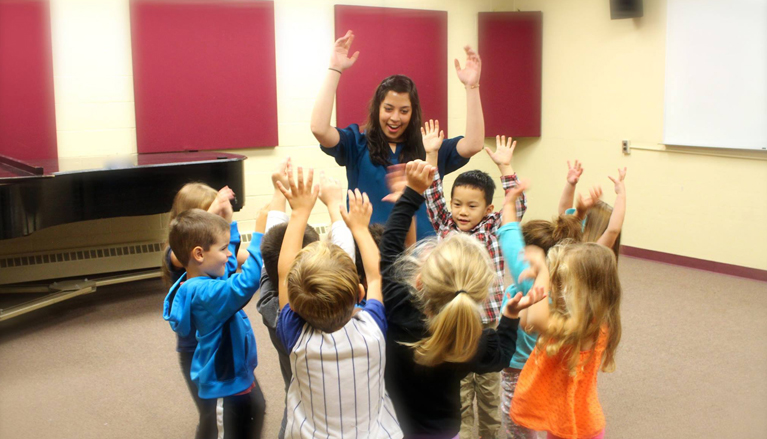Music education majors tune up preschool research

Jeanne Marie Stalteri, a Slippery Rock University music education major from Indiana, Pennsylvania, leads children in a “song game” promoting learning and a good time.
Jan. 19, 2016
SLIPPERY ROCK, Pa. - Four Slippery Rock University music education majors have received a $500 SRU research grant to study how music education helps young children develop hand-eye coordination, pre-reading and social skills.
Wesley Woodward of Erie, Josh Bonnici of Grove City, Jeanne Marie Stalteri of Indiana, Pennsylvania and Sean Mitchell of Waterford will be working directly with the SGA Preschool located in the McKay Education building at SRU. Their study is titled, "Development of Kinesthetic Movement, Memory and Fine and Gross Motor Skills Through Music Education."
While helping them in their quest to become teachers, the undergraduates said making melody with preschoolers will give their charges the outlet to be creative, silly and have fun in an educational setting.
"I believe music education can greatly enhance the education and development of students, particularly in the younger age group," Stalteri said. "Music provides a vast outlet of possible opportunities for children to grow in their developmental, personal and social skills while having a little fun."
Educators say music education can help children focus on tasks, remember directions and develop control of their hand muscles. Children learn through play and active involvement in activities. Following patterns they're given with instruments provides practice, and repeating short songs and rhymes is an important in developing pre-reading skills, Lisa Ringer, SGA Preschool director, said
Students said they became interested in early childhood music education research after volunteering their time as teaching assistants with Cassandra Eisenreich, SRU instructor of music. Eisenreich leads an initiative that offers free music lessons to children at the Butler County Children's Center.
"Various teaching activities can involve music in an education setting," Stalteri said. "Students can move and or clap a steady beat to a song or play basic instruments themselves. Using music can trigger students' memory, such as teaching a student when to be quiet, or when to sit down or stand up based on a short melody played."
Woodward said music education correlates to lessons taught in other disciplines.
"Activities such as bouncing a ball in time to music teaches students about time and tempo," he said. "This helps build on a student's developing motor skills. Another activity that we used involved building notes with Popsicle sticks and assigning them fruit names - apple for eighth notes and pear for quarter notes. By building simple patterns with students, they are learning to read rhythm and building on problem solving when you make a pattern and ask them to say it."
Josh Bonnici, a music education and music performance major, finds the connection between music and early education compelling.
"My interest in music began with playing piano when I was only 4 years old," said Bonnici, "I feel like I can accredit a lot of the connections and processes that I have learned throughout life, to music. I'm interested in whether or not this affects other children like it did me."
Bonnici added that there are many applications for music education with children.
"Children need to have a means of expressing themselves and music gives an outlet that many other subjects cannot provide," continued Bonnici. "Cooperating with one another, sharing, being part of a group, incorporating movement with music and quick call and response exercises are just a few applications that music education can bring to a child's life."
Eisenreich, who is supervising the research, said she is pleased to see the music education majors taking an interest in musical cadence for youngsters.
"I am proud of the work these students are doing," Eisenreich said. "The students have great ideas, and I look forward to watching them grow as they expand the initiative to reach more kids."
Students received a Student Research, Scholarly and Creative Achievement Grant, funded through the provost's office. The program provides support for student-faculty research directed toward a joint presentation, publication or performance.
MEDIA CONTACT: Gordon Ovenshine | 724.738.4854 | gordon.ovenshine@sru.edu

